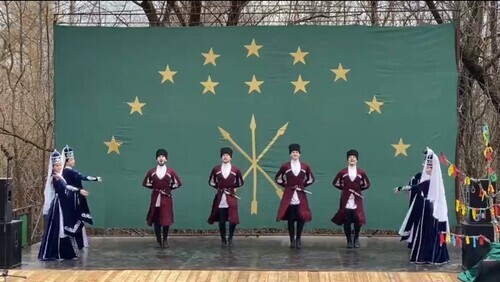Circassian New Year has lost its everyday meaning in Adygea
The celebration of the Circassian New Year marked on March 21 has lost its meaning associated with the beginning of field work, and is perceived by residents only as a cultural event, local scientists and activists have noted. On this day, some families lay tables and see the winter off, residents of Adygeisk have informed.
The "Caucasian Knot" has reported that the events on the occasion of the Circassian New Year were included into the state programme for the development of culture in Adygea. They are held annually on the day of the vernal equinox. In Kabardino-Balkaria and Karachay-Cherkessia, this day is not celebrated. The Circassian New Year comes from paganism; it is not popular among Adygs (Circassians), since they do not want to compromise their Islamic identity, activists said earlier.
The revived tradition of celebrating the Circassian New Year in Adygea is ten years old, the Ministry of Culture of Adygea has reported.
The nations traditionally engaged in agriculture used to mark the holidays associated with cyclical natural phenomena, said Zarema Tseeva, a historian, noting that "with the adoption of Islam, this holiday was ousted from the family and social life."
In his turn, Asfar Kuek, a writer, believes that the revival of the tradition of celebrating the Circassian New Year helps to unite the people. Ten years ago it became clear that children know neither their mother tongue nor Circassian traditions, he has added, stressing that now this holiday has united all the Circassian republics. Each village holds a torchlight march, headed by a village elder who offered up a prayer for a good harvest. Young people in national costumes walked around the courtyards and performed ritual songs and dances.
This article was originally published on the Russian page of 24/7 Internet agency ‘Caucasian Knot’ on March 21, 2021 at 09:44 pm MSK. To access the full text of the article, click here.
Source: CK correspondent






![Tumso Abdurakhmanov. Screenshot from video posted by Abu-Saddam Shishani [LIVE] http://www.youtube.com/watch?v=mIR3s7AB0Uw Tumso Abdurakhmanov. Screenshot from video posted by Abu-Saddam Shishani [LIVE] http://www.youtube.com/watch?v=mIR3s7AB0Uw](/system/uploads/article_image/image/0001/18460/main_image_Tumso.jpg)